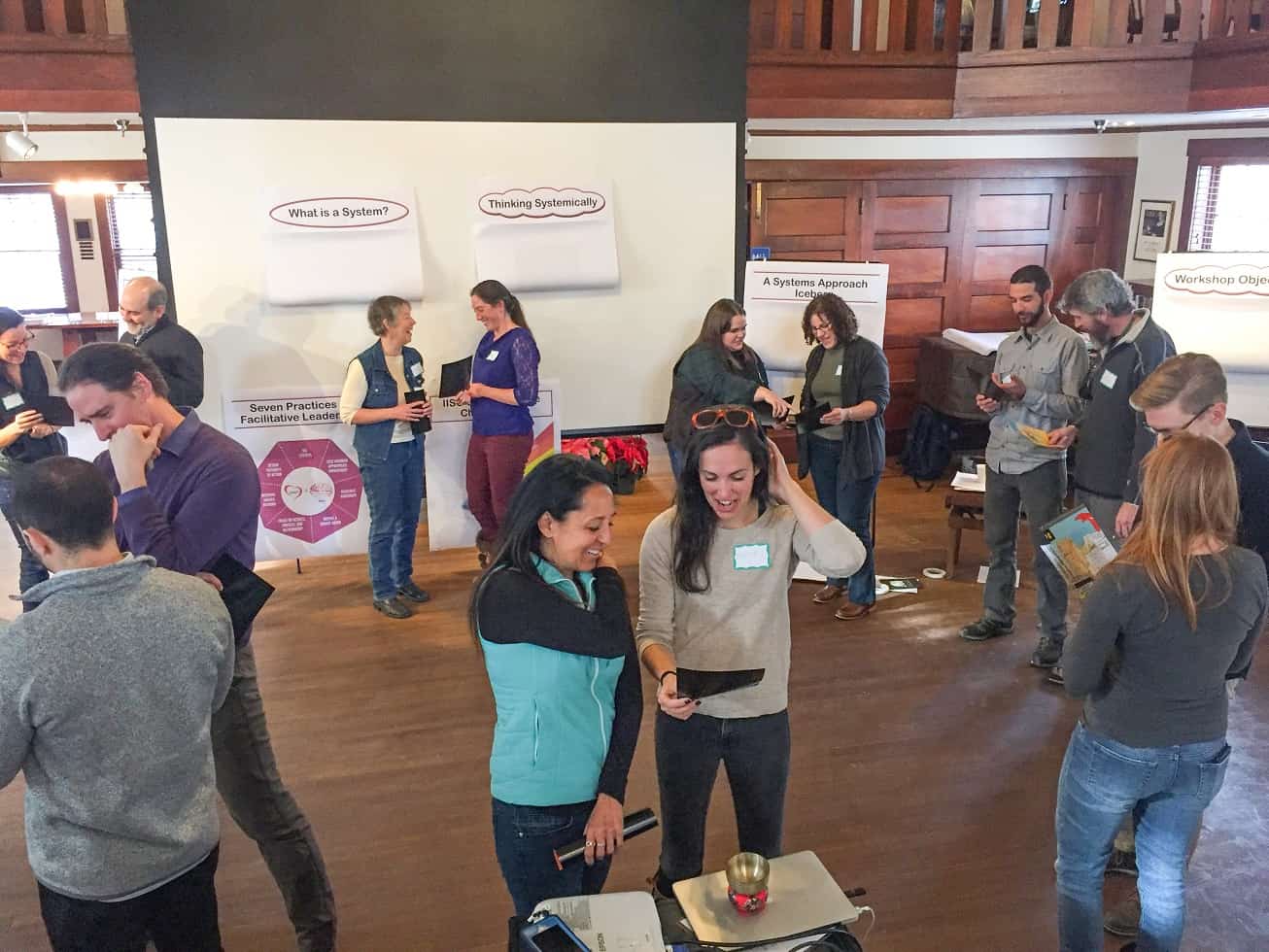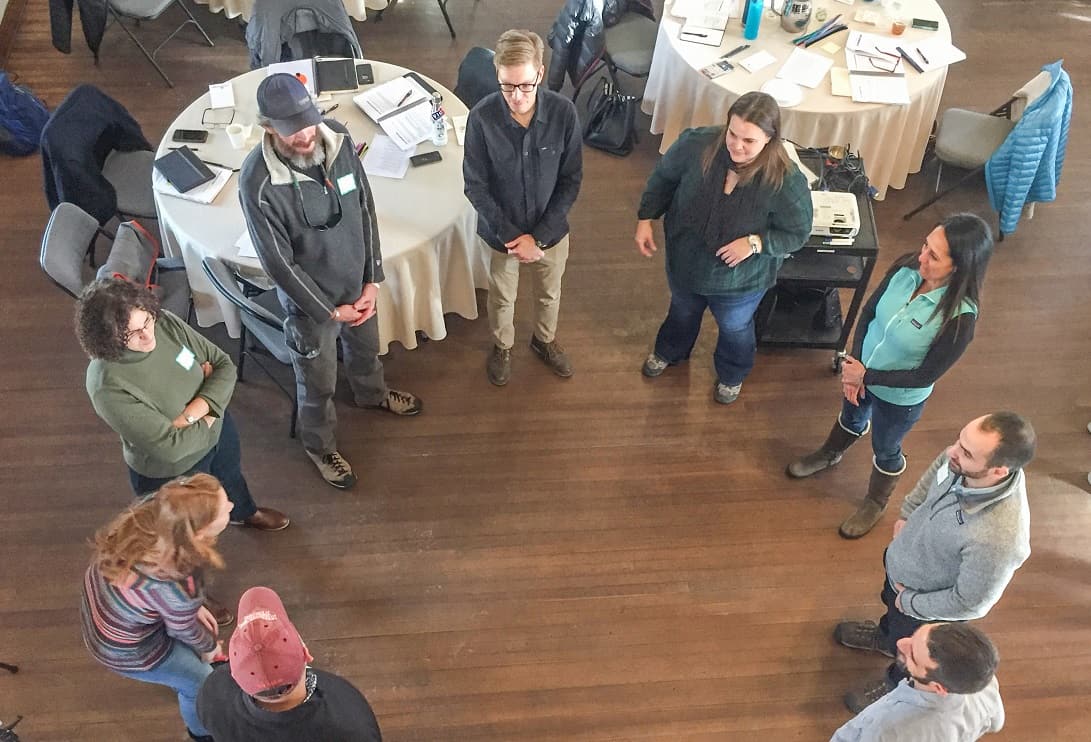Photo Credit: A recent facilitative leadership training focused on how to be a better listener, leverage others’ interests and strengths, and adapt based on what your partners and systems need.
Twenty members of the Fire Adapted Communities Learning Network (FAC Net) and Fire Learning Network (FLN) — experts in prescribed burning, ecosystem management and community wildfire adaptation — recently gathered to learn a different kind of skill: how to create the conditions for people to move together from vision to action. The Facilitative Leadership for Social Change workshop, designed by the Interaction Institute for Social Change, helps leaders make it “easy for others to offer their unique perspectives and talents, speak up when they have problems, take initiative, make appropriate decisions, work with others, and share responsibility for the health of the team, organization or community.”

Credit: Wendy Fulks, The Nature Conservancy
This was the third time the FLN has offered this training to members. Unlike the first two workshops, which were landscape-based, these participants self-selected. The result was a diverse group, with representatives from a dozen organizations and 13 states, adding richness to the experience.
It Was Magic
Over the course of two days, the Interaction Institute’s Curtis Ogden led us through an exercise-rich agenda that also allowed ample time for reflection.
It just so happened that our workshop began a mere 10 days after the devastating Camp Fire in California had been fully contained. As a result, the mood was somber as we trickled into the meeting room on the first day and took our seats. To begin, Curtis helped us calm and open our minds, encouraging us to “luxuriate in this time together”— which we did! — and consider how our work was addressing the larger, timely need to promote healing for both people and landscapes.
He talked about other, seemingly very different groups he was working with, and how our fire networks are part of a bigger story. And he spoke of connections, courage, innovation and systems built on social agreements and interactions.
Curtis was grounding us in the notions that, job titles notwithstanding, all of us in the room were in the business of effecting social change, and that there are some common realities and challenges that all social change agents constantly grapple with. The group seemed reassured to hear that they would leave the workshop with some practical concepts, tools and behaviors to help them be more successful change agents. And that was, indeed, the case.
What People Said
Probably the most helpful workshop I have ever participated in. The tools presented I feel I will use not only in my work but in my personal life as well.
Provided a new way to think about being a leader by supporting and encouraging opportunities for others to lead themselves and be successful.
An excellent survey course that integrates meeting facilitation best practices with a focus on relationships and conditions that support them. It is a facilitation training with heart, not a presentation of clinical checklists common to other training courses.
“Our long-term success depends on all of us becoming better facilitative leaders, and this training lays the groundwork and opens up the toolbox that will allow us to live up to our true potential.”
Powerful Lessons
While it’s impossible to share the full impact of this workshop in a brief blog post, some key takeaways are worth highlighting — and exploring:
- One’s approach can change after realizing that it’s impossible to “empower others.” It’s better to think in terms of “creating conditions for self-empowerment.” A discussion about this brought to mind Jana Carp’s asset-based community development work, which took place in a part of rural Northern California threatened by wildfire.
- Consider taking a systems-thinking approach to your situation if you haven’t already. (Did you include partners?) Then ask yourself, “How do I change myself to help change the system?”
- The importance of listening (aka “deep listening” and “listening as an ally”) can’t be overstated. You can learn to be a better listener (PDF, 155KB).
- Have you ever thought about the importance of space when designing a meeting or a social change effort? Just the right amount of space is important. (The blog post “Change Is About Letting Go, Creating Space … and Connecting” explains.)
- Do you agree with Curtis, who said, “Busyness is oppressive, especially when one is trying to work with an equity lens”? How might you address this in your world?
- How might you do things differently if you thought about your professional role as simply working to create shared meaning?

Credit: Wendy Fulks, The Nature Conservancy
What Next?
I suggest we all make a point of honing our facilitative leadership skills in 2019. For me, that will include focusing on relationships and process as much as — or more than — results, and practicing my deep listening skills. As social change agents, what are your most vexing problems? And how might you change your thinking and behaviors to address them?
Please note that comments are manually approved by a website administrator and may take some time to appear.



Great summary and great workshop, Wendy! I feel super lucky I was able to participate.